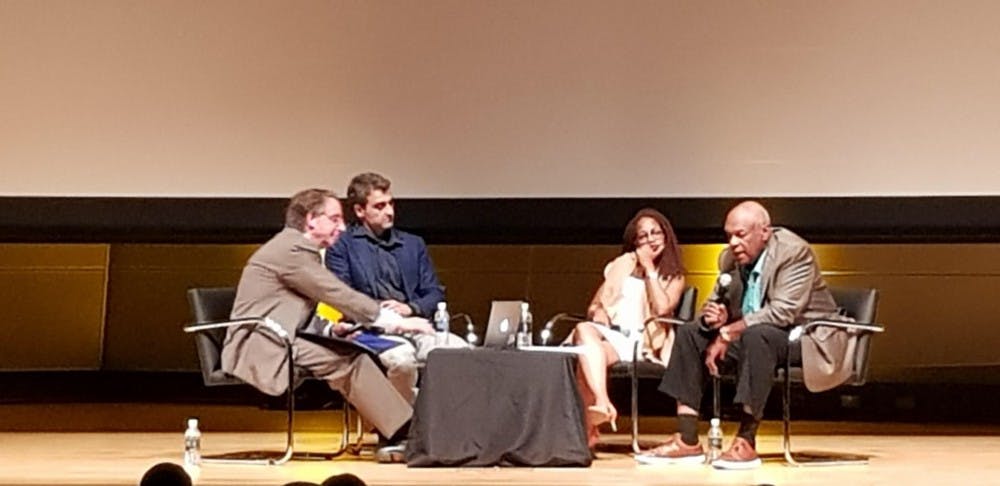On Thursday, Sept. 19, the Maryland Institute College of Art (MICA) hosted three political advocacy figures. They took part in a panel discussion on the past and present challenges to democracy in the United States.
The participants in the panel were Courtland Cox, civil rights activist and organizer in the Student Nonviolent Coordinating Committee (SNCC); Nicole Hanson, advocate for ex-offenders and director of Out for Justice; and Eric Gottesman, photographer and founder of For Freedoms Project.
Each member of the panel addressed the theme of the night in a way that reflected their work. Cox addressed what he saw as the inherent inequality of the U.S. government and the activism that minority groups have had to engage in to push the government towards being a true democracy.
“America has become much more democratic because of the struggles of the women movements, because of the struggles of the Civil Rights Movement, the struggles of the LGBT community, the struggle of Native Americans, the struggles of unions,” he said. “It is the struggle of the people that have made this country much more democratic as we go on.”
Hanson, who was incarcerated as a young adult, explained that lack of education poses a constant challenge to the voting rights and participation of formerly incarcerated U.S. citizens.
“There was no education done around informing us,” Hanson said. “No widespread education to inform citizens of Maryland that they now had the right to vote. But then, there was no education around informing probation and parole officers that their clients were now allowed to vote.”
Cox echoed Hanson’s sentiment that a lack of formal education can pose a barrier to voting rights. He further explained that this is a problem with deep historical roots. He recounted a similar situation with the lack of literacy that limited voting participation in Lowndes County, Alabama.
“Most of the people were not literate,” Cox said. “What we had to do was create comic books, and what we did was we broke [down] the laws for running for sheriff and their responsibilities into very common language and we were able to make sure that they were able to understand it.”
Gottesman’s objectives for the For Freedom Project also involve engaging the public in politics.
“What we are trying to do is to reach people who have not necessarily been considering themselves to be part of politics,” Gottesman said. “We want to hear what everybody has to say. We want to bring everybody into the conversation.”
The organization’s primary method of achieving this is through the public presentation of artworks across the nation, using visible mediums such as billboards. The art usually provokes a reaction from the surrounding community.
“We worked with 120 artists across the country, to put these images up. And some of them were unclear what exactly was going to happen, what was the artist’s message, and that was exactly what we were trying to do,“ Gottesman said. “As we scaled up the number of billboards across the country, we started getting a lot of different, really interesting reactions.”
Hanson also expressed her desire for community engagement, emphasizing her work on engaging and educating the general public of Maryland on the issues of convicted citizens.
Furthermore, she expressed frustration at certain community-related actions taken by the University, including the administration’s decision to establish a private police force.
“Hopkins, considering it’s a health care institution, should be having all the solutions on how to not incarcerate and deal with this violence like it’s a health epidemic, like it’s a health problem, but instead they ask for a police force,“ Hanson said. “It says a lot about a nationally-recognized health care institution that they don’t even have a health care solution to violence.”
However, Hanson commended the work of the Hopkins student body and encouraged them to continue engaging with the greater Baltimore community.
“The students are doing a great job. Whatever the students have been doing, tell them to keep it up, ramp it up, they have the support of Out for Justice,“ Hanson said. “They have the support of other members of the community. They are doing everything right and they need to keep it up and they need to keep holding their institution accountable.”
Cox also voiced the importance of involving younger activists to establish a more democratic America.
“How do we get today’s youth, today’s activists, to begin to determine that they need to engage in a generational struggle that will make change?“ Cox said. “It is only with that generational struggle and the determination of the demands that they will make to this society, that we will be able to have a more democratic society.”
Gottesman emphasized that the diversity of the American public should be kept in mind when voting for politicians, who are supposed to represent society.
“How do you make sure that everyone is included?” he asked. “There is no real, one way in which America looks or is supposed to looks. It is in the multiplicity that we can start to find our identity and start to look for a way forward.”





